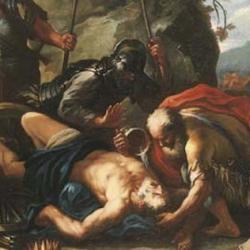The Psalm recorded in 1 Chronicles 16 (Psalm 105) exhorts the singers to “remember forever His covenant, the Word He commanded to a thousand generations” (v. 15). The covenant with Abraham and Isaac, confirmed to Jacob and Israel, has to do with the land: “To you I will give the land of Canaan as the portion of your inheritance” (v. 18).
The Psalm spells out the social circumstances of the original recipients of the promise. Yahweh swore to give them the land when they were “few in number, very few” (v. 19), when they had no claim on the land, being “strangers” who wandered through the land (vv. 19–20). The Hebrew word for “few” is ominous, punning on mot, the Hebrew word for death. They have no obvious future except continued dispossession.
There was no way to extrapolate from Abraham’s standing as sojourner to future ownership of the land. God’s oath bridged the gap. His covenant pledge alone gave Israel hope that they would inherit the land where they wandered.
For Paul, the pledge of Canaan was only a down-payment on a universal inheritance. God promised Abraham that he would be “heir of the world” (Romans 4:13).
So: In many places in the world Christians are “few, very few,” wandering strangers. But the covenant stands. Jesus is the seed of Abraham, the heir of the covenant promise. In Him, Christians are heirs of the world, no matter how displaced we may be at present. In Jesus we are raised from our “death” as aliens, as few, very few, into the glory of our inheritance.
We may look like strangers, but whatever land we walk is Christ’s, and Christ is ours. And in the meantime, we are under His protection, anointed kings of a world we do not yet possession (v. 21–22).
To walk by faith means to know that everywhere we walk, we are walking on land pledged to us, confirmed by oath. To walk by faith is to walk like Abraham, not Adam; it is to wait patiently for the Lord to give our inheritance, and not to seize it.















